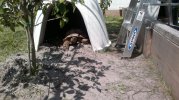- Joined
- Apr 5, 2012
- Messages
- 17
Ive heard this alot from various breeders and vendors, but I havent been able to find a consistent reason why.
I do know Ive never seen RT hatchings, or CB RTs at the reptile shows Ive been to.
My russians have been doing fine outside the past few months. I got a couple 7" proven breeding females a couple days ago and now I dont feel comfortable just waiting for a symptom to show up lol
Any thoughts on what it is that may irk them?
I do know Ive never seen RT hatchings, or CB RTs at the reptile shows Ive been to.
My russians have been doing fine outside the past few months. I got a couple 7" proven breeding females a couple days ago and now I dont feel comfortable just waiting for a symptom to show up lol
Any thoughts on what it is that may irk them?
